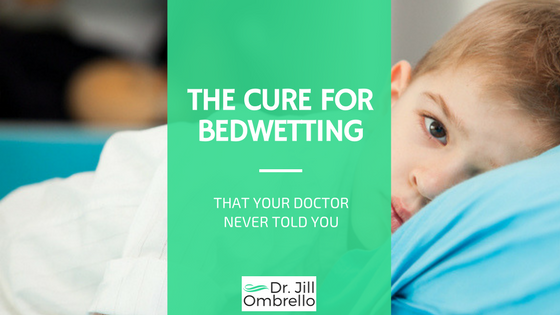Happy Children’s Dental Health Month! February is especially close to my heart, because nothing gives me more satisfaction in my job as improving the life of a child. When it comes to children’s health, we tend to talk about establishing good toothbrushing habits, learning to floss, and drinking fluoride-enriched tap water. These are crucially important lessons for our little ones, but we often forget that dental health goes much deeper than just establishing good hygiene. Proper care early in life can have a huge impact on the rest of a child’s life.
So, in honor of Children’s Dental Health Month, I want to talk about an extremely common and distressing problems that many children face, and a surprising ripple effect of poor oral health: Bedwetting.
Bed wetting can often feel like a shameful secret for you and your child to grapple with alone, but it shouldn’t be! Roughly 1 in 5 grade school age children wet the bed at night, and for some the problem can persist well into the teenage years. You’re certainly not alone, and there are more ways to help your child than you might think!
Children often feel embarrassed and guilty over wetting the bed, and may even deny themselves the fun of sleepovers or overnight camps because they are afraid that someone might find out, damaging both their social life and their self esteem. Meanwhile, parents grapple with frustration and anxiety when they are unable to help their children.
It’s not a matter of learning control or discipline — bedwetting is a medical condition that is completely outside of your child’s control. There’s no need for shame or blame, just proper care. While bedwetting itself isn’t a serious health concern, it can be a symptom of a deeper problem for your child which does need to be addressed, a sort of natural alarm-bell that your child’s sleep isn’t healthy. Some children just need a few more years to develop the connection between brain signals and bladder, but some children need medical help to guide proper development.
Unfortunately, many families treat it as a private matter and don’t seek the help they need. Even if you have spoken to your pediatrician, many of the most common treatments like bedwetting alarms and medication don’t get at the root cause of your child’s distress.
The good news is, there’s no need for you or your child to suffer in silence! And here’s where dental health comes in — bedwetting can actually be caused by sleep disordered breathing, a condition caused by a restricted, underdeveloped airway. SDB makes it impossible for your child to get a good night’s rest, no matter how diligent you are with bedtimes. When the body’s sleep cycles are thrown off it can result in problems like bedwetting, fatigue, mouth breathing, anxiety, and many more.
The Healthy Start program uses painless, non-invasive mouth gear to guide jaw development and open up the airway, allowing children to experience a good night’s sleep — possibly for the first time in their lives. Once children begin receiving proper treatment, their bedwetting symptoms rapidly dry up. For so many families who have struggled with the problem for years, it really is that easy. Many families see results in a matter of weeks.
If your child suffers from bedwetting, there’s no need for them to avoid sleepovers — or for you to do a nightly load of laundry. Speak to a Healthy Start provider or certified dentist today about getting your child the help they need for a lifetime of dry, restful sleep.

